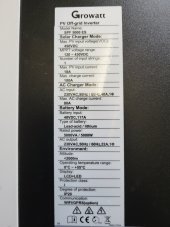squowse
Solar Enthusiast
- Joined
- Jan 4, 2021
- Messages
- 582
The short circuit current is Isc. All your wires/cables should be rated for the Isc current or you have a dangerous installation.Absolutely no problems with overpaneling. I have 3750 watts in panels going to a Growatt 2000w inverter. At mid day, the inverter takes 2200w. It still wouldn't be a problem if I had 10000 watts in panels. The inverter will only take what it needs. The only risk is if somehow the MC4 cable got cut or damaged in such a way that it would cause a short, it would burn up pretty quickly, rather than burn up slowly. But then burning up quickly might be better, since it would be kind of like a fuse.
This includes the controller. As far as know, only Victron actually specify the max Isc though
Last edited:



